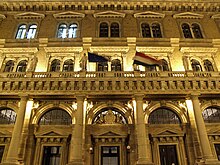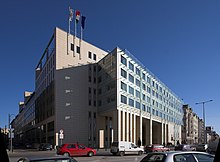Corvinus University of Budapest
Budapesti Corvinus Egyetem[1] | |
 | |
| Motto | Scientia mea - Adiutor meus (My knowledge is my helper) |
|---|---|
| Type | Public university |
| Established | 1920 |
| Rector | Prof. Dr. András Lánczi |
Administrative staff | 867 |
| Students | 14,500 |
| Location | Budapest, Hungary |
| Campus | Urban |
| Affiliations | Professional organisations: AACSB, AFANet, APSA, DRC, EAPAA, EUA, ECLAS, EFMD, ESA, IAU, ICA, IFLA, NISPA, PRME. Professional networks: ECA, CEEMAN, CEMS, EDAMBA, FFNet, LE NOTRE, MIRC, PIM |
| Website | www.uni-corvinus.hu |
Corvinus University of Budapest (Hungarian: Budapesti Corvinus Egyetem) is a university in Budapest, Hungary. Corvinus University of Budapest is a research university oriented towards education. The university currently has an enrollment of approximately 14,500 students, offering educational programmes in business administration, economics, and social sciences.
Corvinus University accepts students at six faculties and offer courses leading to degrees at the bachelor, master and doctoral level in specialisations taught in Hungarian, English, French or German.
The University was listed in the top 50 in the Financial Times European Masters in Management rankings,[2] and was the first Hungarian university mentioned among the best in the area of agriculture.
Ministers of finance, chairmen of the National Bank of Hungary and prime ministers studied at Corvinus.
Contents
1 History
2 Faculties
3 Setting and architecture
4 Student life
5 Credentials controversy
6 Notable alumni
7 See also
8 Notes
9 References
10 External links
History
In 1846, József Industrial School opened its gates with departments for economics and trade for upper grade students. The immediate forerunner of the Corvinus University of Budapest, the Faculty of Economics of the Royal Hungarian University, was established in 1920. The faculty was an independent organization that was granted the same status as faculties of other universities.[3]
In 1934, the faculty was merged with other institutions including the University of Technology to form the Hungarian Royal Palatine Joseph University of Technology and Economics.[4] Modern economist training began in 1948, when the Hungarian University of Economics was established as a separate universitas.[5] Since then, the institution has undergone multiple name changes. In 1953 it was renamed Karl Marx University of Economic Sciences.[6] In 1990 the political system changed in Hungary. After 43 years democratic and free parliamentary elections were held. Following that the name of the university was changed to the University of Economics of Budapest.
In 2000, with the integration of the College of Public Administration, the institution was named Budapest University of Economic Sciences and Public Administration (BUESPA). The College of Public Administration was founded in 1977.[7]
In 2003, the three faculties of the former University of Horticulture (then part of the Szent István University) were integrated into the BUESPA. The first predecessor of the horticulture faculties, the School for practical Gardening (1853 - 1860) was the first institution of horticultural professional training in Hungary. The school was founded and managed by the horticultural scholar and publicist Dr Ferenc Entz (1805 - 1877), who was also a corresponding member of the Hungarian Academy of Sciences (HAS).[8]
In 1939 an independent Royal Horticultural Academy was launched. It included three departments: agriculture, horticulture and landscape architecture. The latter was one of a kind in Hungary at the time.
In 2004, the university received its present name.[9]
The name the Corvinus University of Budapest refers to the name of Corvinae (codices). Bibliotheca Corviniana was one of the most renowned libraries of the Renaissance world, established by the king Matthias Corvinus of Hungary.
The Faculty of Public Administration was appended[10] to the newly formed National University of Public Service[11] on January 1, 2012.
From 2013 Corvinus University of Budapest offered a Summer School program.[12]
Faculties
As of 2016, the university has three faculties:

Façade of the university
- Faculty of Business Administration
- Faculty of Economics
- Faculty of Social Sciences
Setting and architecture

Main building
The university is in an urban setting. The faculties operate in multiple buildings that stand in the city centre of Budapest.
The university's main building – now part of the UNESCO Heritage Site[13] – is located in Pest on the left bank of the Danube, next to the Great Market Hall and facing the Budapest University of Technology and Economics on the river's other bank. The main building was planned by Miklós Ybl as the Main Customs Office in Neo-Renaissance style. It was finished in 1874. The building was called "Vámház" (Customs House) and "Fővámpalota" (Chief Customs Palace). This is also the name of the nearby avenue. The building was connected to ports of the Danube by four tunnels. It had a railroad connection. During WW2 the Hungarian, German and Soviet troops used the building as a military base. The Customs House suffered serious damage during the war. In 1948 it became the main building of the University of Economics. It underwent major renovations in 1950 and later in 1989–1990.
Much of the education of the business faculties (Faculty of Business Administration, Economics, Social Sciences) takes place in the main building. This is the location of the rector's offices as well.

The Közraktár Street building
The university's Közraktár Street building was completed in 2007. It offers 50,000 square metres (540,000 sq ft) of floor space, which includes an office building and education areas. The building has community areas, and hosts the 450-seat central library of the university which contains 100,000 books and journals.[13][14]
Student life

Lecture hall

Central library at the new Közraktár building
Seven colleges for advanced studies are connected to the university. These are student groups that offer their own body of extracurricular coursework and often provide accommodation for their members as well.
- Rajk László College for Advanced Studies
- Széchenyi István College for Advanced Studies
College for Advanced Studies in Social Theory (Társadalomelméleti Kollégium, TEK)- EVK College for Advanced Studies
- Heller Farkas College for Advanced Studies
- Society of Young Autonomous Economists (FAKT)
Credentials controversy
Andrew Reynolds, professor of political science at the University of North Carolina at Chapel Hill, have questioned the validity of a doctoral degree awarded by Corvinus University to Sebastian Gorka who briefly served in Donald Trump's white house, noting discrepancies between how doctorates are normally awarded and how Gorka's was awarded. Reynolds said that the evaluations of each referee on Gorka's PhD committee was "a page of generalized comments – completely at odds with the detailed substantive and methodological evaluations that I've seen at every Ph.D defence I've been on over the last twenty years." According to Reynolds, one of the referees had published with Gorka previously, in violation of the academic expectation that reviewers have no personal or other form of interest in the success of a candidate's thesis.[15][note 1]Georgetown University associate professor Daniel Nexon reviewed Gorka's PhD thesis, describing it as "inept" and saying "It does not deploy evidence that would satisfy the most basic methodological requirements for a PhD in the US".[16] A number of other academics and policymakers have also questioned Gorka's academic credentials.[17][18][19][16][20][21][22]
Notable alumni
Sándor Csányi - Chairman of OTP Bank, owner of Bonafarm, investor, philanthropist, billionaire, the richest person in Hungary (according to Forbes)
Bajnai Gordon – former Prime Minister of Hungary
Bokros Lajos – former Minister of Finance, Chairman of Budapest Stock Exchange
Dávid Korányi – director at Atlantic Council
József Váradi – CEO of Wizz Air
Kovács Ákos – singer, one of the best-selling artists in Hungary
Surányi György – former Chairman of the National Bank of Hungary
See also
- Open access in Hungary
Notes
^ In academic circles, even though financial incentives are not involved, a personal interest amounts to conflict of interest. "Factsheet: Conflict of Interest" (PDF). Elsevier.com..mw-parser-output cite.citation{font-style:inherit}.mw-parser-output q{quotes:"""""""'""'"}.mw-parser-output code.cs1-code{color:inherit;background:inherit;border:inherit;padding:inherit}.mw-parser-output .cs1-lock-free a{background:url("//upload.wikimedia.org/wikipedia/commons/thumb/6/65/Lock-green.svg/9px-Lock-green.svg.png")no-repeat;background-position:right .1em center}.mw-parser-output .cs1-lock-limited a,.mw-parser-output .cs1-lock-registration a{background:url("//upload.wikimedia.org/wikipedia/commons/thumb/d/d6/Lock-gray-alt-2.svg/9px-Lock-gray-alt-2.svg.png")no-repeat;background-position:right .1em center}.mw-parser-output .cs1-lock-subscription a{background:url("//upload.wikimedia.org/wikipedia/commons/thumb/a/aa/Lock-red-alt-2.svg/9px-Lock-red-alt-2.svg.png")no-repeat;background-position:right .1em center}.mw-parser-output .cs1-subscription,.mw-parser-output .cs1-registration{color:#555}.mw-parser-output .cs1-subscription span,.mw-parser-output .cs1-registration span{border-bottom:1px dotted;cursor:help}.mw-parser-output .cs1-hidden-error{display:none;font-size:100%}.mw-parser-output .cs1-visible-error{font-size:100%}.mw-parser-output .cs1-subscription,.mw-parser-output .cs1-registration,.mw-parser-output .cs1-format{font-size:95%}.mw-parser-output .cs1-kern-left,.mw-parser-output .cs1-kern-wl-left{padding-left:0.2em}.mw-parser-output .cs1-kern-right,.mw-parser-output .cs1-kern-wl-right{padding-right:0.2em}
References
^ "Corvinus University - Study in Hungary". En.study-hungary.com. Retrieved 2017-06-24.
^ "Archived copy". Archived from the original on 2008-05-14. Retrieved 2008-05-20.CS1 maint: Archived copy as title (link)
^ "1920. évi XXXI. törvénycikk | 1000 év törvényei". 1000ev.hu. Archived from the original on 2017-07-25. Retrieved 2017-06-24.
^ "1934. évi X. törvénycikk | 1000 év törvényei". 1000ev.hu. Retrieved 2017-06-24.
^ "MT 2001/8 14". Matud.iif.hu. Retrieved 2017-06-24.
^ "Közgazdászképzés története". Uni-corvinus.hu. 2016-07-28. Retrieved 2017-06-24.
^ "Archived copy". Archived from the original on 2011-05-25. Retrieved 2009-01-02.CS1 maint: Archived copy as title (link)
^ "Kertészettudományi Kar". Kerteszettudomany.uni-corvinus.hu. 2016-07-28. Retrieved 2017-06-24.
^ "A Karok története". Uni-corvinus.hu. 2016-07-28. Retrieved 2017-06-24.
^ [1]
^ "Uni-Nke | Uni-Nke". Uni-nke.hu. Retrieved 2017-06-24.
^ "Corvinus Summer School". Uni-corvinus.hu. Retrieved 2017-06-24.
^ ab "Új épület a Corvinus Egyetemnek". Epiteszforum.hu. Retrieved 24 June 2017.
^ "Archived copy". Archived from the original on 2012-07-30. Retrieved 2009-01-02.CS1 maint: Archived copy as title (link)
^ Reynolds, Andrew (April 27, 2017). "Stop Calling Him 'Dr.': The Academic Fraud of Sebastian Gorka, Trump's Terrorism 'Expert'". Haaretz. Retrieved April 27, 2017.
^ ab Cite error: The named reference:2was invoked but never defined (see the help page).
^ Jaffe, Greg (February 20, 2017). "For a Trump adviser, an odyssey from the fringes of Washington to the center of power". Washington Post.
^ Cite error: The named reference:0was invoked but never defined (see the help page).
^ Cite error: The named reference:1was invoked but never defined (see the help page).
^
Boot, Max (February 21, 2017). "The Worst and the Dimmest". Foreign Policy. Retrieved February 25, 2017. (Subscription required (help)).
"Perspective | Survival tips for Sebastian Gorka, PhD". Washington Post. Retrieved February 27, 2017.
"Dr. Sebastian Gorka May Be a Far-Right Nativist, But for Sure He's a Terrible Scholar". Foreign Policy. Retrieved March 17, 2017.
^ Cite error: The named reference:5was invoked but never defined (see the help page).
^ "Sebastian Gorka, Trump's most controversial national security aide, is out". Vox. Retrieved 2017-08-27.
External links
- Official website
- MBA Programme Website of Corvinus University, School of Management
- History of Corvinus University in English
- Scientific Journal of the Faculty of Economics
- International Economy and Business Programme
Coordinates: 47°29′10″N 19°3′29″E / 47.48611°N 19.05806°E / 47.48611; 19.05806
